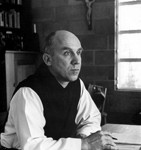 Thomas Merton was adamant that television — at least American television — was a danger for any who are interested in progressing further in the practice of contemplation. He expresses himself on the subject with characteristic verve, a little acerbity, and a not-untypical degree of exaggeration.
Thomas Merton was adamant that television — at least American television — was a danger for any who are interested in progressing further in the practice of contemplation. He expresses himself on the subject with characteristic verve, a little acerbity, and a not-untypical degree of exaggeration.
“The life of a television-watcher is a kind of caricature of contemplation. Passivity, uncritical absorption, receptivity, inertia. Not only that, but a gradual yielding to the mystic attraction until one is spellbound in a state of complete union. The trouble with this caricature is that it is really the exact opposite of contemplation: for true contemplation is precisely the fruit of a most active and intransigent rupture with all that captivates the senses, the emotions, and the will on a material or temporal level. The contemplative reaches his passivity only after terrific struggle with everything that appeals to his appetites as a half-animal member of the human herd. He is receptive and still only because the stillness he has reached is lucid, spiritual, and full of liberty. It is the summit of a life of spiritual freedom. The other, the ersatz, is the nadir of intellectual and emotional slavery.”
 The danger of servitude, especially to the electronic media, is not only that it wastes time and incapacitates, but it also serves as a channel through which the evil thoughts about which Benedict speaks (cogitationes malas, 4:50), enter the mind of the monk or nun and thence pass through to the community. I am not speaking merely about lubricious thoughts-the “scurrilities” to which Benedict was so uncompromisingly opposed-I am thinking of the erosion of fundamental values and the coarsening of the mind itself that result from daily preoccupation with triviality. When the beliefs and values weaken, only external constraint holds us to monastic praxis, and the level of joie de vivre ineluctably declines.
The danger of servitude, especially to the electronic media, is not only that it wastes time and incapacitates, but it also serves as a channel through which the evil thoughts about which Benedict speaks (cogitationes malas, 4:50), enter the mind of the monk or nun and thence pass through to the community. I am not speaking merely about lubricious thoughts-the “scurrilities” to which Benedict was so uncompromisingly opposed-I am thinking of the erosion of fundamental values and the coarsening of the mind itself that result from daily preoccupation with triviality. When the beliefs and values weaken, only external constraint holds us to monastic praxis, and the level of joie de vivre ineluctably declines.
Michael Casey, OSCO; Strangers to the City, p. 43.

I love this post. I was getting all the cable TV channels. I’m not much for dramas and sitcoms, but CNN and CNBC were on all the time at work and at home. It started to make my wife and me anxious every time we turned on the TV to hear about how bad the economy is. (I work for a newspaper, so believe me, I already know how bad it is.) Recently, we canceled most of our cable TV. We kept basic cable so we could have access to local news during storms and emergencies. And you know what happened? We haven’t turned the TV on at all in a couple of months, except to check on the storms the other night. I feel better. I have more time for reading. We sit around and talk more. We don’t miss it at all.